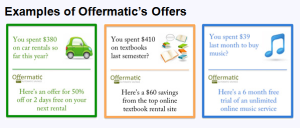A few months ago, I’d posted a blog about why credit cards don’t necessarily lead to overspending.
Now, forget overspending: the recently launched Offermatic promises that you can actually save – and make – money by using credit cards.
 When you sign up for Offermatic, you register your credit card(s) with it. Offermatic will then securely connect to your online bank to download your transactions. Based on your purchasing history, it will send you emails containing highly relevant money saving offers on everyday purchase items like car rentals, textbooks and music.
When you sign up for Offermatic, you register your credit card(s) with it. Offermatic will then securely connect to your online bank to download your transactions. Based on your purchasing history, it will send you emails containing highly relevant money saving offers on everyday purchase items like car rentals, textbooks and music.
As an icing on the cake, Offermatic will pay you $15 per year per card even if you don’t use any of its offers – as gratitude for registering and using its service. This way, you can make money on your card even as a passive user of Offermatic.
As in the case of Mint, WeSabe, Kublax and other personalized personal finance management (P2FM) services, you have to give away the keys to your online account to Offermatic to receive its offers. Like I’ve written before, that might stop a lot of people – including me – in their tracks.
However, there’s a difference: By giving away your login credentials to P2FM services, you’re letting them access your entire bank account. You’ve to take them at their word that they’ll not do anything other than download your transaction statements. Whereas, in the case of Offermatic, you’re only letting it access your credit card account. So, it can’t do much else than download your transaction statements, as long as you don’t have your credit card and checking / savings accounts in the same bank.
However, the situation becomes complicated with debit cards, which can also be linked on Offermatic’s website.
With the exception of the decoupled variant that has gained traction only in the US so far, debit cards are issued as an add on to checking / savings account held with a particular bank. Therefore, by letting Offermatic access your debit card online account, you’re in effect opening up your checking and savings accounts to it. In this case, Offermatic poses the same security concerns as P2FM services. Notwithstanding Mint’s $170M+ exit to Intuit, the CEO of a newly-shuttered P2FM company told me recently that security concerns are playing havoc with the plans of many P2FMs to achieve scale, and are bound to stunt the growth of Offermatic.
Going past security concerns, Offermatic has a strong story in terms of the usefulness of its offers. In a blog post explaining the rationale behind the founding of Offermatic, its founder Faisal Quereshi claims that Mint and other P2FM services only make offers for financial products. Since I haven’t linked any of my bank accounts to Mint due to the aforesaid security concerns, I don’t receive any offers from it. Therefore, I’ve no way of knowing if Mint’s offers are restricted to financial products. But, assuming it’s true, I agree with Quereshi that it’s very difficult to avail oneself of financial offers because, as he says, “switching financial accounts is about as much fun as a root canal”. Since Offermatic’s offers relate to everyday purchase items, they’re bound to be far more useful to its users.
One more interesting thing about Offermatic is its claim to be able to come up with offers that are guaranteed to save you as much as 90% of the sticker price on various items. Now, readers might have come across such deep discounts only on GroupOn and other group buying sites. Unlike offers on those websites, an offer from Offermatic is valid regardless of how many other people sign up for it. This should guarantee far greater conversion for Offermatic’s offers.
Offermatic has found an interesting niche between P2FM and group buying services. If it’s able to allay security concerns and craft the right go to market strategy for signing up a large enough base of advertisers ready to make the offers for it to distribute, Offermatic should have a bright future.
Pingback: Whose Transaction Is It Anyway? « Talk of Many Things
Cheap Dedicated Proxies
I found a great…